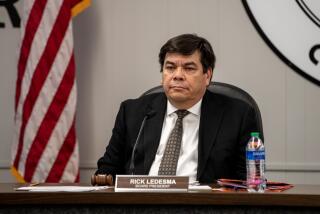Recall Efforts Give Voters a Midterm Voice
- Share via
Lately, I’ve spent a lot of time asking people to sign petitions to recall South Orange County Community College District (SOCCCD) Trustee Steven J. Frogue. I have stood in front of a sign demanding “Stop Bigotry & Abuse of Power.” Frogue’s penchant for conspiracy theories with anti-Semitic overtones made headlines. His leadership of a college board majority so intent on “reform” that they’ve “overlooked” district and state policies resulted in court intervention, with more lawsuits pending. The turmoil has inspired an unprecedented exodus of high-level administrators, adding to the furor.
You’ve perhaps seen volunteers outside supermarkets, post offices, coffeehouses or on the district’s two campuses, Irvine Valley and Saddleback. We’re enthusiastic, friendly. We smile but worry. The clock is ticking. Our deadline, March 24, was too close. Last Thursday, recall leaders decided to admit defeat. Unable to collect the 38,500 required by the county registrar of voters, but inspired by a sudden influx of money, leaders declared this effort dead and decided to begin a new one.
I imagine others facing similar decisions, including those from three high-profile recall campaigns underway in California. One, in Fresno, targets Mayor Jim Patterson; another is directed at Los Angeles City Councilman Mike Hernandez. Closer to home, a recall has been launched against Orange Mayor Joanne Coontz.
Like ours, these campaigns struggle to reach their goals: enough signatures to put their recall measures on the ballot. Recalls allow those voters to pass judgment midterm, to change their minds. Recalls are a vital part of the democratic process.
Yet recall efforts are uncommon because they require so much effort. Recalls usually respond to perceived egregious offenses, proponents believing the threat so serious that their community can’t wait for the regular election cycle to oust the offending politician.
The recall effort in Fresno needs 16,000 signatures to qualify. In Orange, the number is 8,000. Recall proponents in Hernandez’s district need 6,300 to qualify. 16,000. 8,000. 6,300. 38,500? By this point in our aborted campaign, we could have qualified once to recall the Fresno mayor and twice for Hernandez or Coontz.
So how is it that recalling a community college trustee is more difficult than a big-city mayor or councilman? This recall is especially interesting. In the fall of 1995, the SOCCCD Board of Trustees adopted a plan seeking to make trustees more representative of their constituencies, more accountable. The district was mapped into areas; trustees were required to reside in areas they represented. But there was a catch: Although trustees’ residencies were restricted to particular areas, voting remained at-large. It was reform, but only partial, providing an illusion of direct representation while, at the same time, preserving the status quo.
Let’s do the math. For any recall to make the ballot, 10% of registered voters must request one. Ten percent of registered voters in the SOCCCD district equals 38,500. But since the district remapping, Trustee Frogue “represents” only Lake Forest and the El Toro Marine Corps Air Station. He is one trustee of six. It would make more sense to have the number of required signatures correspond to the voters he actually represents.
We wouldn’t have had a problem if we had not had to collect so many signatures. If the board had adopted a truly representational model instead of one that appears to be one, our recall efforts might already be successful. Instead, the board’s trustee area plan protects it from recalls--and, by the way, guarantees the continuance of big-budget campaigns and discourages competition. Prospective candidates with funds to run campaigns in their hometowns might balk at financing a campaign in not one, but 10 cities.
Considering the challenge of organizing across the sprawling district, our citizenry responded well in confronting this crisis in leadership. Will we prevail next time? I don’t know. I hope so because it’s essential to change leadership that’s intolerant and autocratic, and I worry for the academic reputation and financial health of our outstanding colleges.
If we don’t prevail, were we--are we--wrong to try? No. It’s always necessary to speak truth to power, to challenge those who abuse it and to remind politicians that they are, ultimately, accountable to us, their constituents--even if they can’t decide who their constituents are.
Recalls are hard. Direct representation is dangerous to a politician’s comfort. The SOCCCD board, like other elected bodies, knows that and, like other elected bodies, did its best to shield itself from the rest of us. Now we know.
More to Read
Sign up for Essential California
The most important California stories and recommendations in your inbox every morning.
You may occasionally receive promotional content from the Los Angeles Times.













